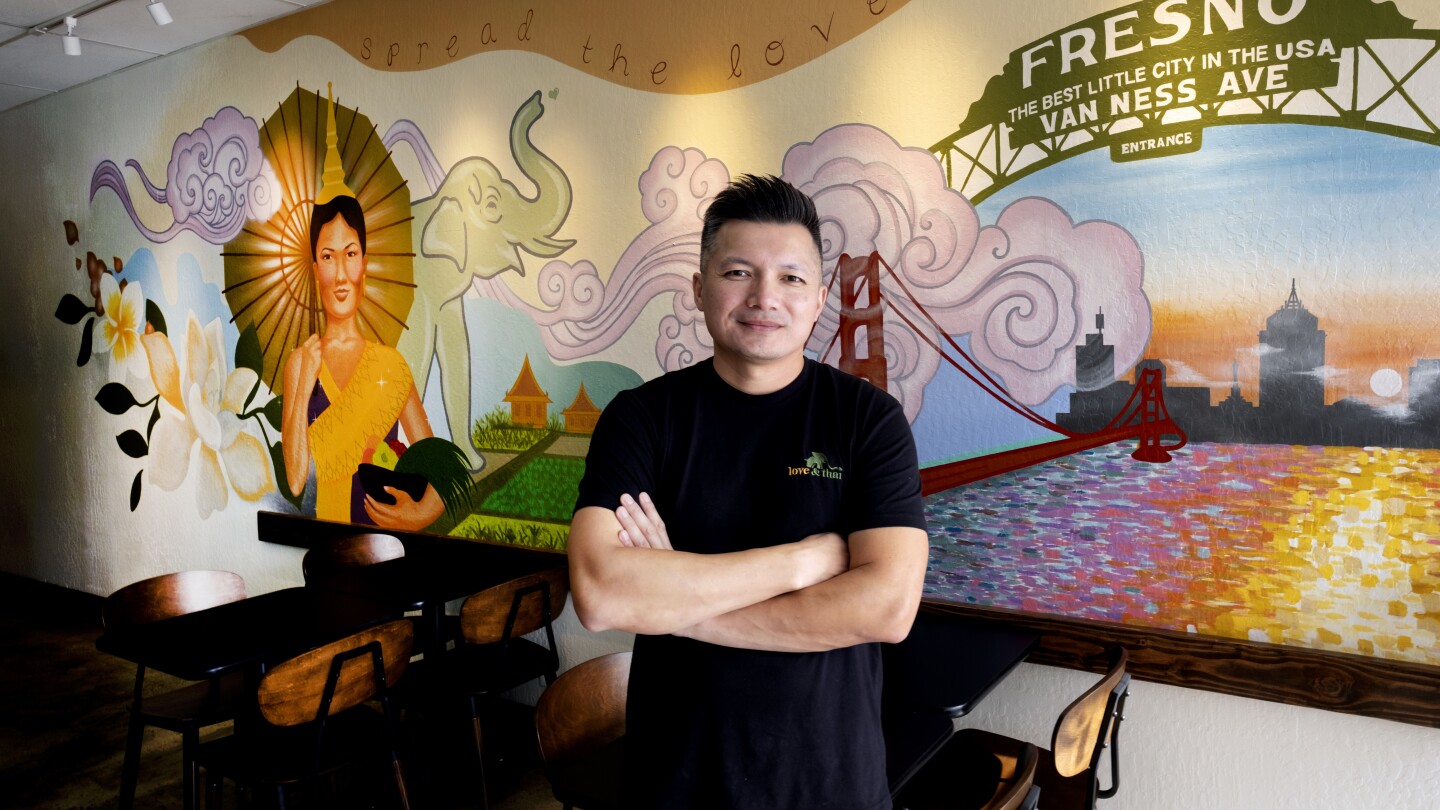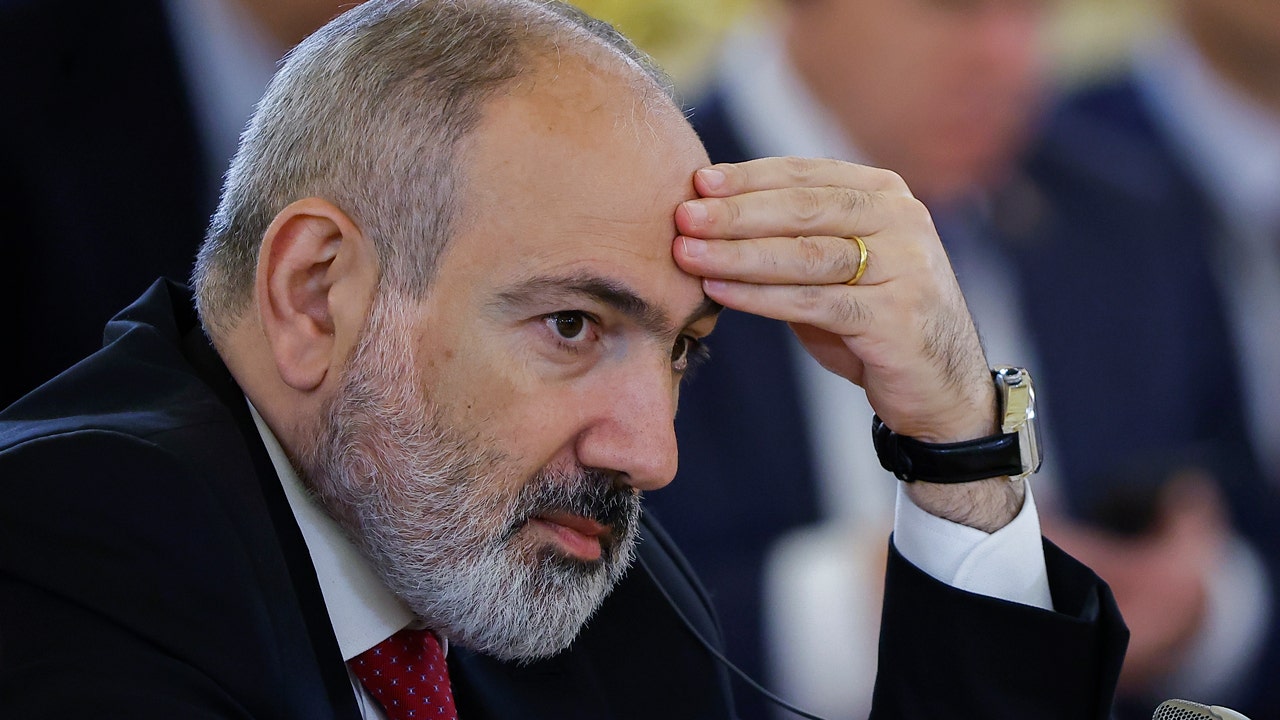World
California restaurant's comeback shows how outdated, false Asian stereotype of dog-eating persists

FRESNO, Calif. (AP) — David Rasavong’s cultural pride is evident all throughout his restaurant.
It’s on the wall of family portraits and where a stunning mural depicts his family’s journey from Laos to California. It’s on the menu filled with Lao and Thai dishes like the crispy coconut rice salad of Nam Khao and the stir-fried rice noodles of Pad See Ew.
And it’s in the fact that Love & Thai in Fresno, California, restaurant is open at all. A baseless accusation grounded in a racist stereotype about Asian food using dog meat brought a six-month barrage of harassment so heated that Rasavong, 41, closed down its previous location over fears for his family’s safety.
His earlier restaurant had itself only been open for seven months when a so-called animal welfare crusader in May implied on social media that a pitbull tied up at an unconnected home next door was going to be served on the menu.
A day after the initial commentary, vitriolic statements, voicemails and calls rained down. Rasavong’s body still tenses up when recounting, in particular, a call from an elderly woman.
“She was so disgusted by me and yelling and screaming, and the only thing I can remember hearing her say at the end was ‘Go back to the country you came from you dog-eating mother-effer,’” Rasavong recently told The Associated Press.
Within days, he closed that restaurant because it no longer felt safe between the harassment and people loitering in the parking lot outside of business hours.
The false accusation tapped into a longstanding slur against Asian cuisines and cultures that has persisted in the U.S. for over 150 years, dating back to the xenophobia that grew in the U.S. after Chinese immigrants started arriving in more visible numbers in the 1800s and other Asian communities followed. It’s also one that Asian American communities are fighting against.
It may be astonishing to some that a claim rooted in a racist stereotype took down a family’s restaurant three years after “Stop Asian Hate” became a rallying cry. But for many Asian Americans and Pacific Islanders, it’s something they’ve heard before as an insult or under the guise of a “joke,” along with other negative reactions to the actual foods of their cultures. In December, a comedian received some backlash for dressing like a UPS delivery driver and walking into an Asian restaurant with caged puppies for a social media video.
There is hope though that more people will learn to tell truth from trope. Since the pandemic first fueled anti-Asian hostilities, AAPI communities themselves have tried to take control of the narrative that Asian food is “dirty,” “weird” yet “exotic.” Furthermore, the appetite to learn about food from the Asian diaspora has only grown across traditional and new media.
Still, there were moments where Rasavong felt like nobody, even media, was on his side. He said a few reporters approached him assuming the claims were true.
But he soon received tons of community support, and the closure ended up being a new beginning.
A shopping center property manager offered him the chance to take over a suite vacated by another restaurant. Nkundwe P. van Wort-Kasyanju, a graphic designer in the Netherlands, and Los Angeles-based interior designer Danny Gonzales proffered their services for free. Hana Luna Her, a local artist, painted the mural. By the Nov. 3 grand opening of the new space, Love & Thai definitely felt the love. The place was bustling all day, Rasavong said, and the city presented a proclamation.
Rasavong is holding onto the belief that he went through this whole saga for a reason.
“There’s a journey that we’re supposed to go on,” said Rasavong, who declined to say if he’ll pursue legal action. “Don’t get me wrong. People need to realize this business is not easy … But you know, we believe in what we’re doing and so far so good.”
In actuality, consuming dog meat is something that has happened in various parts of the world for centuries, where they weren’t seen as domesticated family pets, said Robert Ku, author of “Dubious Gastronomy: The Cultural Politics of Eating Asian in the USA.” Greeks and Romans referenced it. The French also ate dog meat during World War II.
But when Chinese immigrants came to the U.S., it was linked to them as part of “the myths that the Chinese were these bizarre people who had bizarre diets,” Ku said. “It was one of the attractions of actually going to Chinese restaurants back in the day because it came with ‘danger.’”
As other Asian immigrant groups came, the stereotype spread to include them.
“This is a real just blurring of the Asian identity where it doesn’t matter if you’re Thai or Korean or Vietnamese or Cambodian. You’re all the same,” Ku said.
Along with the false allegation of eating dog meat, Asian Americans and Pacific Islanders over the generations have often faced disgust and worse from others when they’ve brought their cultures’ foods from home to public spaces like school or work.
They’re taking steps to fight back, like in 2021, when San Francisco-Bay Area-based writers Diann Leo-Omineto, Anthony Shu and Shirley Huey self-published “Lunchbox Moments,” a compilation of over two dozen personal essays and illustrations that raised $6,000 for charity.
The project became “a powerful thing for all of us,” Leo-Omineto said.
“We tried to show it’s not always about being in relation to being American or being white or assimilated,” she said. “You can have moments of joy, too…I hope that it opened people’s minds a little bit more — or made them want to try new foods.”
It’s actually been a big year in publishing and food media for Asian cuisine. Publishers Weekly dedicated a feature in August entirely to Chinese and Taiwanese food after observing nine new cookbooks on the subjects were coming out this year. Several of the authors grew up outside of Asia. The titles range from “Vegan Chinese Food,” to “Kung Food” and “A Very Chinese Cookbook” from America’s Test Kitchen. Also, children’s book author Grace Lin released “Chinese Menu,” which relays folklore behind favorite Chinese American dishes. They all share personal anecdotes and readers often seem drawn to “personality-driven” cookbooks, said Carolyn Juris, features editor.
“It’s not just about the recipes. It’s about the stories behind them and I think people respond to that,” Juris said.
Like any other culture, Asian cultures encompass many different regional cuisines and nuances. With the growing Asian diaspora, it’s not strange that so many cookbooks can be mined and “publishers are savvy enough to know that there is a market for these books,” Juris added.
Back at Love & Thai, Rasavong is busy filling online orders for a waiting third-party delivery driver. He is optimistic about keeping up business now that the initial hoopla around his restaurant renaissance has calmed down. Rasavong also hopes his situation will remind others to think before they speak.
“People say these jokes and they think it’s just fun and just light-hearted,” he said. “There are certain things that you shouldn’t say that really do cross a line.”
___
Tang is a Phoenix-based member of AP’s Race and Ethnicity team. Follow her on X (formerly Twitter) at @ttangAP.

World
Heartbreak High Renewed for Third and Final Season at Netflix

ad
World
Protesters demand Armenian prime minister's resignation after border villages ceded to Azerbaijan

Thousands of protesters gathered Thursday in the Armenian capital, Yerevan, to demand the resignation of Prime Minister Nikol Pashinyan over his government’s decision to hand over control of border villages to Armenia’s long-time rival Azerbaijan.
Armenia and Azerbaijan have fought two wars since the Soviet Union collapsed and Armenia said in April that it would return the villages to Azerbaijan. That decision came after Azerbaijan in September waged a lightning military campaign in Nagorno-Karabakh, a majority ethnic Armenian region inside Azerbaijan. That caused tens of thousands of people to stream into Armenia, sparking demonstrations as protesters called for the prime minister to be ousted.
Protesters led by a senior cleric in Armenia’s church walked a distance of around 100 miles from villages near the border with Azerbaijan to Yerevan where they gathered Thursday in Republic Square.
ARMENIA’S PRIME MINISTER IN RUSSIA FOR TALKS AMID STRAIN IN TIES
Videos shared on social media showed thousands of people waving Armenian flags. A senior Armenian cleric said a prayer and told the protesters he gave Pashinyan one hour to resign, blaming him for the loss of Armenian territory.
Archbishop Bagrat Galstanyan told protesters they should “engage in peaceful acts of disobedience,” if Pashinyan did not listen to their demands.
Pashinyan visited Moscow Wednesday and held talks with Russian President Vladimir Putin amid spiraling tensions between the estranged allies. The meeting took place a day after Putin began his fifth term at a glittering Kremlin inauguration which the Armenian leader did not attend.
Armenian Prime Minister Nikol Pashinyan attends a meeting of the Supreme Eurasian Economic Council of the Eurasian Economic Union at the Kremlin in Moscow, Russia, on Wednesday, May 8, 2024. (Evgenia Novozhenina/Pool Photo via AP)
Putin’s spokesperson Dmitry Peskov was quoted Thursday by Russian state news agency Tass as saying the two leaders had agreed to the removal of Russian forces from some Armenian regions.
In brief remarks at the start of the talks, Putin said that bilateral trade was growing, but acknowledged “some issues concerning security in the region.”
Pashinyan, who last visited Moscow in December, said that “certain issues have piled up since then.”
Armenia’s ties with Russia, a longtime sponsor and ally, have grown increasingly strained after Azerbaijan waged its military campaign in September to reclaim the Karabakh region, ending three decades of ethnic Armenian separatists’ rule there.
Armenian authorities accused Russian peacekeepers who were deployed to Nagorno-Karabakh after the previous round of hostilities in 2020 of failing to stop Azerbaijan’s onslaught. Moscow, which has a military base in Armenia, has rejected the accusations, arguing that its troops didn’t have a mandate to intervene.
The Kremlin, in turn, has been angered by Pashinyan’s efforts to deepen ties with the West and distance his country from Moscow-dominated security and economic alliances.
While Pashinyan was visiting Moscow, Armenia’s foreign ministry announced that the country will stop paying fees to the Collective Security Treaty Organization, a Russia-dominated security pact. Armenia has previously suspended its participation in the grouping as Pashinyan has sought to bolster ties with the European Union and NATO.
Russia was also vexed by Armenia’s decision to join the International Criminal Court, which last year indicted Putin for alleged war crimes connected to Russia’s actions in Ukraine.
Moscow, busy with the Ukrainian conflict that has dragged into a third year, has publicly voiced concern about Yerevan’s westward shift but sought to downplay the differences.
Kremlin spokesman Peskov conceded Tuesday that “there are certain problems in our bilateral relations,” but added that “there is a political will to continue the dialogue.”
World
Ukraine’s Zelenskyy fires head of state guard over assassination plot

Ukrainian state security said earlier this week that they unearthed an assassination plot including two state guards.
Ukrainian President Volodymyr Zelenskyy has fired the head of the state guards following allegations that two members were involved in a plot to assassinate the embattled Ukrainian head of state.
Zelenskyy dismissed former leader of the state guards Serhiy Rud on Thursday, after the state security service (SBU) said earlier this week that it had unearthed an assassination plot against Zelenskyy and other important officials. A successor for Rud has yet to be named.
The SBU said that the assassinations were meant to be a “gift” for Russian President Vladimir Putin as he was sworn in for a new term in office on Tuesday.
The SBU said that the two men, both colonels in the state guard, had planned to take Zelenskyy hostage and later kill him.
Other key officials, including SBU head Vasyl Maliuk and Kyrylo Budanov, the military intelligence agency’s head, were also said to be targets of the failed effort.
Moscow has not commented on the allegations by the SBU, which alleged that the two bodyguards had passed on sensitive information to the FSB, Russia’s security service.
It is not the first assassination effort that the Ukrainian leader has faced down, stating last year that at least five Russian plots have been foiled since the war began.
Zelenskyy’s administration has faced growing difficulties in recent months, and has shaken up some key staffing positions as progress in the country’s war against Russia stalls out and officials face accusations of corruption.
In February, Zelenskyy named Oleksandr Syrskyii as the new army chief after dismissing General Valerii Zaluzhny from the position.
-

 World1 week ago
World1 week agoStrack-Zimmermann blasts von der Leyen's defence policy
-

 Politics1 week ago
Politics1 week agoStefanik hits special counsel Jack Smith with ethics complaint, accuses him of election meddling
-

 Politics1 week ago
Politics1 week agoThe White House has a new curator. Donna Hayashi Smith is the first Asian American to hold the post
-

 Politics1 week ago
Politics1 week agoDemocratic mayor joins Kentucky GOP lawmakers to celebrate state funding for Louisville
-

 World1 week ago
World1 week agoTurkish police arrest hundreds at Istanbul May Day protests
-

 News1 week ago
News1 week agoVideo: Police Arrest Columbia Protesters Occupying Hamilton Hall
-

 Politics1 week ago
Politics1 week agoNewsom, state officials silent on anti-Israel protests at UCLA
-

 News1 week ago
News1 week agoPolice enter UCLA anti-war encampment; Arizona repeals Civil War-era abortion ban















